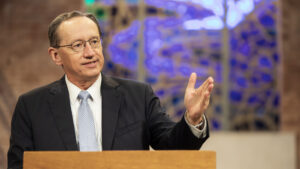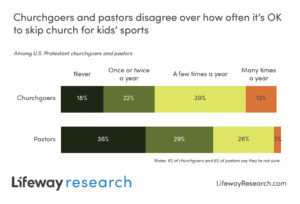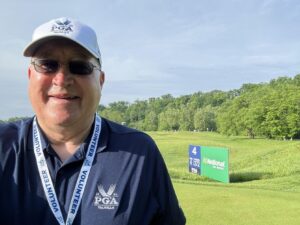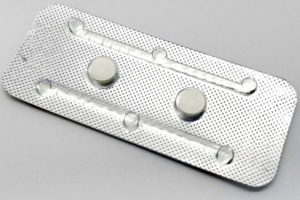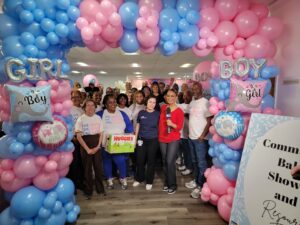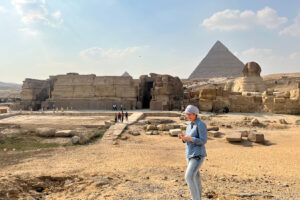

Rebuild Haiti: Building Homes, Healing Hearts
by Alan James
 Carved into the concrete floor of a one-room house in Port-au-Prince, Haiti's capital, are the words "With God all things are possible."
Carved into the concrete floor of a one-room house in Port-au-Prince, Haiti's capital, are the words "With God all things are possible."
The family living there lost their home January 12, 2010, when a 7.0-magnitude earthquake shook Haiti, claiming 230,000 lives and leaving more than 1.5 million people homeless.
Now this family has a home to call their own again. It's a simple 12-by-16-foot house of cinder blocks and wood with a tin roof.
But those words — written in the local Creole language — are a powerful reminder of how God has blessed them.
"Every time they step on that doorstep, there it is at their feet," said Mark Rutledge, an International Mission Board missionary assisting with Haiti relief efforts. In recent months, Rutledge has visited more than one hundred families who now have new homes.
"It's hard to describe the thankfulness people have for what has been done for them," added Rutledge, who currently is stateside but plans to return to Haiti with his family.
Through a collaborative effort called "Rebuild Haiti," the International Mission Board, Baptist Global Response, the Florida Baptist Convention, Southern Baptist Disaster Relief, and Haitian Baptists plan to build 3,200 houses by the end of 2013. And that number could rise to as many as 6,200 houses, said Jeff Palmer, executive director of BGR.
Since the disaster, Southern Baptists have given more than $13 million to relief efforts.
In addition to building homes, these funds have helped provide temporary shelters, medical care, food, supplies, and clean water to desperate Haitians. Now, the main focus is building homes at a cost of about $2,500 each.
"We like this transitional house we're working with," Palmer said. "It's just one room, but it's expandable. They can put another room on-or two rooms. It gives them something to start with that they can build on."
A drive through the capital city of Port-au-Prince continues to reveal the magnitude of the damage from a year ago. Thousands of Haitians still live under tarps in cramped, unsanitary "tent cities."
The few Haitians whose homes have been rebuilt are spreading their joy and appreciation by helping others in their communities. Haitians are picking up hammers, pushing wheelbarrows, and working alongside volunteers and missionaries to help rebuild homes-and lives.
The rebuild also is helping the local economy and providing more jobs for people out of work.
"You're not just building houses," Palmer said. "You're stimulating local industry as well.
"The houses are all built out of materials that are available [locally]," he said. "Doing things locally, you put local people to work."
Teams of Haitians also are being trained to lead the work effort.
"Our goal is to have ten to twenty Haitian teams that are out helping to build these houses," Palmer said. "It gives them ownership, gets them involved, gives them income, and a job.
"In the long run, it's going to take Haitians to rebuild Haiti."
Local churches also are joining the effort and reaching out to those in need.
One of those churches is Shiloh Baptist Church, located on one of the many Port-au-Prince streets hit hard by the earthquake.
A year ago, the disaster claimed the life of the church's pastor, three church leaders, and more than twenty other members and destroyed most of its facility. In the weeks following the earthquake, many of its eight hundred members were living outside the church building under blue tarps.
"All our strong leaders in the church who were spiritual giants were prepared to go to the Lord … were the ones who were taken," said one member just days after the disaster.
"We don't know where our future leaders will come from."
Another church member added, "The same God that allowed this to happen can rebuild it."
One year later, the congregation worships under the leadership of a new pastor in the lower, open-air portion of their facility, which remains damaged but usable. Children's classes are now held under the blue tarps where church members once lived.
"Shiloh is doing fairly well," said Rutledge, who had regularly attended the church years ago with his family.
"They are actively involved now in rebuilding homes in their area … redoing and helping people to repair houses."
The Gospel also is spreading as congregations who lost their buildings relocate to areas where there weren't any churches, Rutledge said.
"We have churches in places that never had churches before simply because of the earthquake bringing down the building," Rutledge added.
"I think that's been a huge positive … continuing to see people baptized and accepting Christ in the church congregations that continue on."
Volunteer medical teams from the United States also continue to treat earthquake victims' lingering health problems, including those affected by the recent cholera outbreak. More than three thousand Haitians have died from the epidemic, according to recent missionary reports.
IMB missionary Delores York vividly remembers what the first few weeks after the earthquake were like when she and her husband Sam helped with a medical clinic along Haiti's border with the Dominican Republic. The Texas native held the hands of the wounded and felt helpless around so many who needed help.
"If your head was still attached, you kind of went to the bottom of the list," York said. "The most critical were seen first. Some people didn't get much care."
Today, Haitians still come into clinics with old earthquake wounds that were never treated. Some have indentions in their skulls; some complain of memory loss. Others have bones that did not heal correctly.
"There's not much you can do for those things," York said. "Sometimes it's just somebody taking the time to care and take a look and sometimes pray for them."
York believes the Haiti earthquake has been a spiritual wakeup call for many Haitians. But as time passes, she acknowledges that the power of the wakeup call will dwindle.
"All of this will die out … but people are willing to talk about God, people that normally wouldn't do it," she said, noting that some voodoo witch doctors have turned to God since the quake.
York said that as Haiti fades from front-page news, she prays that Southern Baptists won't forget what happened there.
"You don't see it on the news, but they need prayer," she said. "If you couldn't send money, if you couldn't go and be there yourself and help with construction, everybody [can] pray.
"The crisis isn't over," she said. "It's going to be a long haul."
Haiti Gaining Hope "One Life At A Time"
by Barbara Denman
 Antonine Toussaint lived with her young children in a makeshift tent of tarp and scrap metal for ten months after the January 12 earthquake that devastated Haiti.
Antonine Toussaint lived with her young children in a makeshift tent of tarp and scrap metal for ten months after the January 12 earthquake that devastated Haiti.
With a new baby on the way, the young mother tried desperately to care for her children in an unsafe area of Croix-des-Bouquet, located east of Port-au-Prince. Surrounded by crime, poverty, and unsanitary living conditions, every day was a struggle for Toussaint to keep her youngsters fed and protected.
When workers with "Rebuild Haiti" learned of her situation, the Southern Baptist initiative began construction on a new home for the single mother. She moved into that new home in October, after having delivered her new baby girl only a few days before the home's completion.
Toussaint was the first homeowner through Rebuild Haiti — a collaborative effort between the Florida Baptist Convention and SBC Disaster Relief. Now working in conjunction with Baptist Global Response and the International Mission Board, the Southern Baptist group is on target to build homes for three thousand displaced Haitian families and very possibly another three thousand homes.
One year after the January 12 earthquake, one hundred new homes have been completed for Haiti's homeless families.
The homes are built from Southern Baptist contributions by Haitian hands, as 180 local employees are on the Rebuild Haiti payroll, earning a living for their families and learning a skill for their livelihood. All building supplies are purchased in the country to help stabilize the local economy.
Toussaint's family was among the hundreds of thousands of Haitians who lost their homes during Haiti's devastating earthquake, many of them still living in makeshift tent cities where food and water are scarce.
The family of Tony Saint Louis suffered a similar fate, losing all their possessions in the disaster. He lives with his family of fifteen in Bon Repos, one of the poorest areas in Port-au-Prince, surviving in the humblest of circumstances.
Now employed by Rebuild Haiti, Saint Louis works hard to manage various facets of the construction efforts, including supplying work teams with materials and supplies and training new work teams.
Despite his own family's plight, the dedicated young man worked for weeks to help his Haitian neighbors receive homes without mentioning his own need.
In December, Rebuild Haiti's staff learned of the family's struggles and began construction on two homes for them.
Now Saint Louis will have a home and a trade to prepare him for the future.
During the past year Florida and Southern Baptists have laid the groundwork for rebirth and transformation in Haiti, said Eddie Blackmon, coordinator of Rebuild Haiti.
"While there are many overwhelming needs in Haiti, God has brought us to a place where we have touched lives and changed lives," Blackmon said. "I believe Southern Baptists are changing Haiti, one life at a time."
From Darkness to Light
by Tristan Taylor
 The Haitian witch doctor stepped into the hot, open air of his yard, his arms filled with the paraphernalia of his dark practice. That caught the attention of his neighbors, who were still living among earthquake-ravaged ruins of their homes in Port-au-Prince. The man dropped his voodoo tools and fetishes on the ground, dug a hole, and pushed his things into it. Then, to his neighbors' astonishment, he poured kerosene into the hole and set it on fire.
The Haitian witch doctor stepped into the hot, open air of his yard, his arms filled with the paraphernalia of his dark practice. That caught the attention of his neighbors, who were still living among earthquake-ravaged ruins of their homes in Port-au-Prince. The man dropped his voodoo tools and fetishes on the ground, dug a hole, and pushed his things into it. Then, to his neighbors' astonishment, he poured kerosene into the hole and set it on fire.
"That was my way of saying, 'Down with Satan and up with the cross,'" said the former witch doctor, who now goes by the name Montfort. His conversion occurred months before a rash of voodoo priest killings started in Haiti, spurred by a fear their black magic was spreading cholera.
Montfort had given his life to Jesus, and he wanted to let others know publicly that he was repenting of his old ways. God had given him a new life, and he was anxious to start living it.
"A lot of his neighbors have said he truly is a new man now," says Delores York, an International Mission Board missionary. "A lot of people … don't recognize him as the same person. They say, 'That really isn't the same man, is it?'"
York met Montfort when she visited his neighborhood with a team of Southern Baptist volunteers after the January 12, 2010, earthquake that destroyed much of Port-au-Prince, Haiti's capital. As part of Southern Baptists' ongoing relief efforts in the area, York — a nurse from Texas — and a team of volunteers from Ingleside Baptist Church in Macon, Georgia, were leading a medical clinic.
At that time, Montfort was going by a different name and still making his living practicing voodoo. Ingleside volunteer Art Barry III pointed out Montfort to York because the volunteer saw a voodoo peristyle — a "temple" where voodoo rituals are conducted — in the man's backyard. Sensing his spiritual need, York shared the Gospel with him in Haitian Creole.
"God sent Sister Delores [York]," Montfort said through a translator. "She told me to put down my old way of life and pick up a way of life in God."
Montfort told York he wanted to turn his life over to Christ. He said he realized Satan had stolen a lot of things from him, and he didn't want to ever go back to that life.
"He finds joy in Christ now," York said. "And he finds joy in sharing Christ."
Montfort's transition from witch doctor to Christian witness was immediate. In addition to burning his voodoo equipment, he started going by the name Montfort to differentiate himself from his dark past.
"He said he wanted to change like Saul changed to Paul," York said. To mark that change, York started calling him by the new name.
Montfort asked York to start a Bible study in the very place he once operated his voodoo business. They started a small group in another neighborhood where Montfort had property. Finally, he even opened up his own home for a Bible study.
York started leading weekly Bible studies in these three different communities of Port-au-Prince. Montfort attended each one, hearing each Bible story three times.
"He was pretty well getting them memorized," York said. "He was leading the songs. He learned to pray. He learned to lead the people in learning memory verses. And he was doing a great job."
But the transition hasn't been easy. Changing both professional and social circles is a tough challenge in the best of times. But to do so in post-earthquake Haiti is a more difficult thing all together. Plus, Montfort has a family to support.
"I need a lot of strength and courage," Montfort said. "I need your prayers so I can get started."
York asked Southern Baptists to pray for Montfort's spiritual growth and for Haitian believers to provide him with the spiritual support he needs. Pray he will also find another way to earn a living.
"I believe God is going to give me work that I can do," Montfort said. "God is going to take care of me because He has a plan for me."







